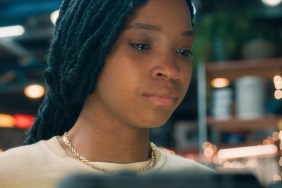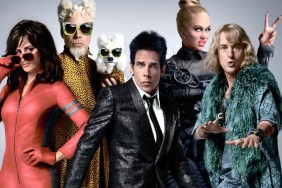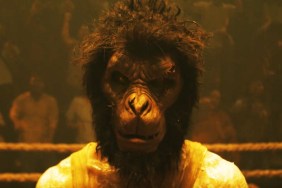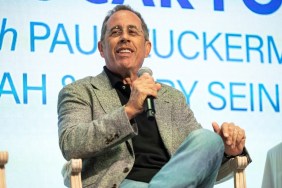Having won numerous awards for his stageplays and an Oscar for his short film Six Shooter, playwright Martin McDonagh has made his first feature film In Bruges, a crime drama set in the historic (or is it esoteric?) Belgian city where Irish hitmen Ray and Ken, played by Colin Farrell and Brendan Gleeson, are sent into hiding after a botched hit. Driven by McDonagh’s witty trademark dialogue and the city’s gorgeous locations, it’s a hitman movie with more than a few twists, mixing sharp biting humor with poignant drama and even a bit of action when their boss Harry, played by Ralph Fiennes, turns up to finish the job.
ComingSoon.net sat down with McDonagh to talk about his transition to filmmaker with a film that harks back to the first films of Ritchie and Tarantino but always with McDonagh’s own unique voice.
ComingSoon.net: I’m sure you get asked this more than any other question, but why Belgium and why specifically Bruges?
Martin McDonagh: Well I just went on a little weekend job from London about four years ago not knowing really anything about the place at all and I just got there and just was struck by how beautiful it was, just how strange as well, kind of untouched since the thirteen or fourteenth centuries, as you saw in the film, with the gothic, medieval architecture. I was wondering why it hadn’t been used on film before because it’s so strange, so perfect. I was wandering around the museums and churches, that was all fine for the first day, but then by the middle of second day after I’d been to every museum twice, or three times, I got a little bored. There wasn’t an awful lot more to do so I just wanted to get drunk and meet women or anything, and that time it became the two sides of my brain kind of talking to each other, the kind of culture-loving chap who likes his churches and museums, and the other side that just wanted to get drunk and laid, so those voices were kind of arguing in my head. But why would these two guys be in a town like this when they didn’t have to be? That’s where the idea of a hit man that has to escape a horrific job kind of popped up, so it’s very organic. If we weren’t allowed to film in Bruges, I would’ve scrapped the whole thing.
CS: Because there’s nowhere else you could’ve done the movie?
McDonagh: No, because it needed to be done somewhere beautiful and distinctive, fairy tale like in some ways. Somewhere that hadn’t really been seen on film before, but also a place where no one really knew, most of the characters in the films say, “Where the f*ck is Bruges?” So it couldn’t be Venice, it couldn’t be Paris, or Prague, so it was perfect.
CS: I’ve been to Belgium probably like three or four times myself and I’ve never even heard of Bruges, so how did you end up there in the first place, was it just some random vacation spot?
McDonagh: Well, I often did these little trips to little towns and cities. From London, you can get to obviously anywhere in two hours, Barcelona and Stockholm, but then once you’ve done Barcelona and Stockholm, you kind of go down a little list and I just saw an image or two online somewhere and thought it would be a beautiful place to check out. I didn’t really know more than that before going, but I like trains as well. I took a train from London to Brussels and then a train up, so that’s part of it.
CS: Trains also seem to be a running theme in your films, no pun intended. Once you decided you wanted to set the movie there, did you go back and spend weeks and weeks there, besides the location scouting?
McDonagh: That was the two-day weekend obviously, but then I had bought a little pocket guide book, then we wrote the script for the next five weeks after that without going back and just going back to this guidebook. We didn’t go back until way after the film was going to be going ahead, like a year or two after, and luckily when I went back, everything worked out, the geography of the town I had remembered right. Then by the time we went into preproduction and scouting, I went there one more time just to check it out, but I’d only been there for five individual days before we got into the heavy work of the two-week scout.
CS: How did you know the locations would work, since so much is written around specific locations, and how did you know you’d be allowed to film in those locations?
McDonagh: Didn’t know at all, but I did write exact specific locations for every scene, like a street name or a church name, but I didn’t know if they would let us or how difficult it would be. They let us film at every single location that was written apart from the inside of one church, they allowed us to shoot inside a different church, but every single one which is pretty unusual in any major town, to be given that kind of access and to be welcomed with open arms as well.
CS: And they must’ve thought “KACHING! A movie set in Bruges, tourism is going to skyrocket!”
McDonagh: Exactly, that was the main thing behind it, but then I was still worried because they didn’t ask to see the script.

CS: Really? Wow, that’s pretty amazing, since that rarely is the case.
McDonagh: Yeah, they did just ask, “Will ‘In Bruges’ still be the title when it comes out?” I said, “Yes,” And they said, “Are you going to just show a lot of the images of Bruges?” And I said, “Yes,” I was still worried that they might think that I was taking the piss out of the town because of Ray, but we showed it about three weeks ago to the mayor’s office, to the tourist board and the Belgium crew who worked on it and they all loved it and were behind it, because even though all the things Colin said about the place are still there, I still think it comes across as a beautiful city.
CS: I think Ken wins out and is more convincing because it’s accompanied by such beautiful images. It’s a beautiful place but like most places, even New York City, after years and years of the same thing you might get bored of it.
McDonagh: I haven’t gotten bored of New York yet.
CS: Since most of your plays are set in Ireland, was it a conscious decision to want to make your first feature film outside your normal setting?
McDonagh: I did it to not really hearken back to the plays or any of that. I wanted to flex a different muscle I guess and make it more European than anything I’d done before. I mean originally they were all supposed to be London gangsters as well so that would’ve been a whole different move to write something. I’ve never had anything on that was a completely sort of London based, but when the chance came to work with Colin and Brandon I didn’t want them to do any accents it was so simple to just let them do their Irish, but of course Ralph’s character is very London, very working class, but yeah, it was about trying to do something that I hadn’t done before, also to show another side of me, or the writing or something.
CS: Also England itself has a long history of gangster dramas, so it must have been good to take it out of London for that reason as well.
McDonagh: Yeah, I didn’t want it to be “Lock Stock,” or any of those pieces.
CS: Did you have any thoughts about whether the movie took place in the present day or in any particular year?
McDonagh: Yeah, we were looking at pretty much around two or three years ago.
CS: You’ve obviously worked with Brendan before in “Six Shooter,” did you know Colin from your theater work, since he also comes from a theater background?
McDonagh: I met Colin just socially once before and I liked him a lot from then. There’s just aspects of the character he certainly has, something kind of sexy and dangerous, which I wanted the character to have, and likable, but also I was more interested in the other aspects of the character, which is certainly the outrageous comedy, but also the sadder, more vulnerable sort of aspects, which we see when you meet Colin, there’s an awful lot more of that than you may have suspected from his press. We sent the script to him and he really liked it from the outset I think. We met here about a year and a half ago, in New York, and he was trying to convince me to use do it unknown actors and that it would lend itself more to that kind of a story.
CS: You mean instead of himself?
McDonagh: Yeah, so that they aren’t bringing any baggage to it. I managed to convince him otherwise and I think he’s brilliant in it. I thought he was always a good actor, but I think he goes to some really dark places that we’ve never really seen before. The first time I met him to talk about it, he didn’t talk about the comedy or the plot, he just talked about the idea of this being a character that’s trying not to commit suicide for three days, which is exactly what I wanted to hear, because he didn’t have to worry about playing the comedy. I knew that he’d play the truth of it first, and the truth of that character is suicide and despair. But he’s such a lovely guy to get along with, such a nurturing person too. This wouldn’t be the film it is without his help. I certainly didn’t direct him much at all. I didn’t coax a performance out of him. Pretty much, my whole thing was to create good characters and not get in the way of good actors trying to perform them.
CS: I do think it’s one of his best performances on film in a long, long time.
McDonagh: Me too. I think he’s a comic genius.

CS: How did you know Colin and Brandon would work so well together?
McDonagh: You don’t really, but I know that they had a lot of respect for each other even though they’ve never worked together. They’ve always liked each other’s stuff, loved each other’s stuff, and that’s a good sign. They’re Irish too and from the same part of the world, and they share the same kind of crazy sense of humor and both just really sweet guys you’re lucky to be around too. I think that’s why it’s kind of palpable that even when they’re bitching at each other in the film, you kind of feel that there’s a bond, there’s a closeness between them, which really kinda comes more and more to the fore as the film goes on, but you can see it, they’re not the kind of people that don’t get along.
CS: I think it’s not clear if the two hitmen knew each other before taking on the hit, because they don’t seem like two guys who would ever be stuck in the same place if something like this hadn’t put them together.
McDonagh: That’s what we analyzed in the rehearsal period. Did they know each other, was there a distant relationship, or are they second cousins, or an uncle? We never really settled on something, but some of the questions we set up helped solve some of those issues and allowed them to go to the place they went to.
CS: How was it working with them in Bruges? Did you have to deal with paparazzi at all?
McDonagh: No, no, we didn’t have a single paparazzi there. The press conference on the first day we got there, photos were taken, but no one really travels to Bruges.
CS: You did the movie fairly under the radar.
McDonagh: Yeah, everyone knew who we were on the streets and there’d always be a little crowd of onlookers and tourists, but there were no problems, no issues, not many photographs. Colin and Brendan are great with photographs and taking autographs, if people are decent to you, you’ll be decent to them, but no paparazzi at all actually.
CS: You’re able to combine heavy drama with dark humor, but is the balance something you developed in rehearsals?
McDonagh: That’s kind of the way I always write, almost all of my plays are that way too, it’s nothing I’ve ever analyzed, but it’s always there, it’s never quite out and out comedy, there’s always kind of something quite dark underneath, and it’s never out and out depressing dark stuff, there’s always something that lifts it, like it can be a dumb gag in the middle of the worst horror, I like that, it’s my sensibility, but I don’t analyze it.
CS: This movie goes to some very strange places, so after you came up with Bruges and the two characters, did you just let it go wherever it went or did you have ideas for specific scenes and you just found a way to tie them together?
McDonagh: No, I pretty much let it go to where it went, but then the idea of what they were running away from came into it and that propelled it into a certain direction, and then knowing that it was their boss who sent them there and he was always going to have to turn up, I kind of let it go to where the characters took it to, almost to let them wander around town in my head and see what threw itself up, but I guess I kind of wanted to deal with certain themes as it started to unfold, I wanted to explore, you know, about films with guys with guns, I kind of let that seep in a little bit, is it cool to write a hitman film? I went to a more difficult, sadder place, you know where did all the stray bullets on the street go when there’s a shootout on the street and no one innocent ever gets hit? What happens when someone does get hit and it’s a person who isn’t necessarily evil, who thinks, and how do you deal with that, how do you deal with a crime like this?
CS: Was the dream sequence influenced by “Living in Oblivion” by any chance?
McDonagh: No, no, I’ve still never seen that. Some people have brought that up with the dwarf thing, but no, I’ve never seen it.
CS: Yeah, the first time I saw it I thought it must have been an homage, since that movie has a very funny sequence with Peter Dinklage, in his first role as a matter of fact.
McDonagh: Now everyone is going to think I ripped it off.

CS: No, no, this’ll set ’em straight. I’ve read that you’ve always loved film, so why did it take you so long to make the jump into filmmaking yourself?
McDonagh: It took me a while to be able to write a good script or to learn how to write a good script, even after the play stuff, it took me about another four or five years to write a script that I was happy with, this was the second of those. Also, I’ve been lucky with the success of the plays and have been tied up with bringing a new one to London, or bringing the London one to Off-Broadway and then taking care of it and bringing it to Broadway, so you almost fall into this kind of treadmill or rollercoaster.
CS: You got too busy the plays to get a film off the ground because it takes up a lot of time
McDonagh: And I’ve found that if I have given a play up and not take the role as writer in the room, it never quite goes
there’s always something missing, there’s always something unexplained, less details, but also I didn’t want to come in as just a writer on a film be completely
CS: You get less control.
McDonagh: Yeah, less control, so I wanted I guess the power to not just be able to make it, direct it, but to direct it without any kind of interference or just any kind of sh*t, so I kind of had to wait until things fell into place for that to happen.
CS: Did you ever direct any of the theatre stuff you wrote?
McDonagh: No, I’ve always been around in the rehearsal room and talking to actors. I like actors, I like talking to them and I like being able to analyze the script and talk about it and I think that’s one of the things that I didn’t realize. We had three weeks of rehearsal at the start of this and I was kind of terrified that I would have nothing to say, but I realized that I had learned a lot just from being in the rehearsal rooms for ten years or so, and if I don’t know the answers at this point, we can come up with the solution to these things as grown men.
CS: Do you have any idea what you’re doing next? Obviously you now have a short film and a feature under your belt, but would you ever want to adapt some of your plays into films?
McDonagh: No, never. I’m opposed to that artistically actually. I think plays should be plays and films should be films.
CS: Even if you directed them yourself?
McDonagh: Never. No, because it’s a separate art form and unless you realize that that’s going to be the end product for all time, you’re not going to go for it as brilliantly as you possibly can. But I’ve got two film scripts ready to go, but honestly I’m kind of not really interested in the whole career thing, so I’m going to take a couple years off and travel. I’ll still write. I’m going to write a play this year I think, but just yeah, just see the world a little bit and come back in a year and a half or two years and see if I want to do one of the scripts or something like that.
CS: Going back to your earlier short, I thought Rúaidhrí Conroy, the actor who played The Kid in “Six Shooter” was great, so what’s he up to do these days?
Mcdonagh: He’s kind of got the same kind of career path of thinking that I do. He lives in Dublin, but he’s a great guy and he’s still one of my best friends in the world, but he’s never really had that career drive as some people would have, but he’s free to work if anyone wants to send him a film or something.
CS: I’ve never heard that before: “I’m not into the whole career thing.” That’s the first time I’ve ever heard that from anyone. Like, “I’m just going to write plays and get awards for them, write movies, whatever.”
McDonagh: It works.
McDonagh’s debut In Bruges opens in select cities this Friday, February 8.









